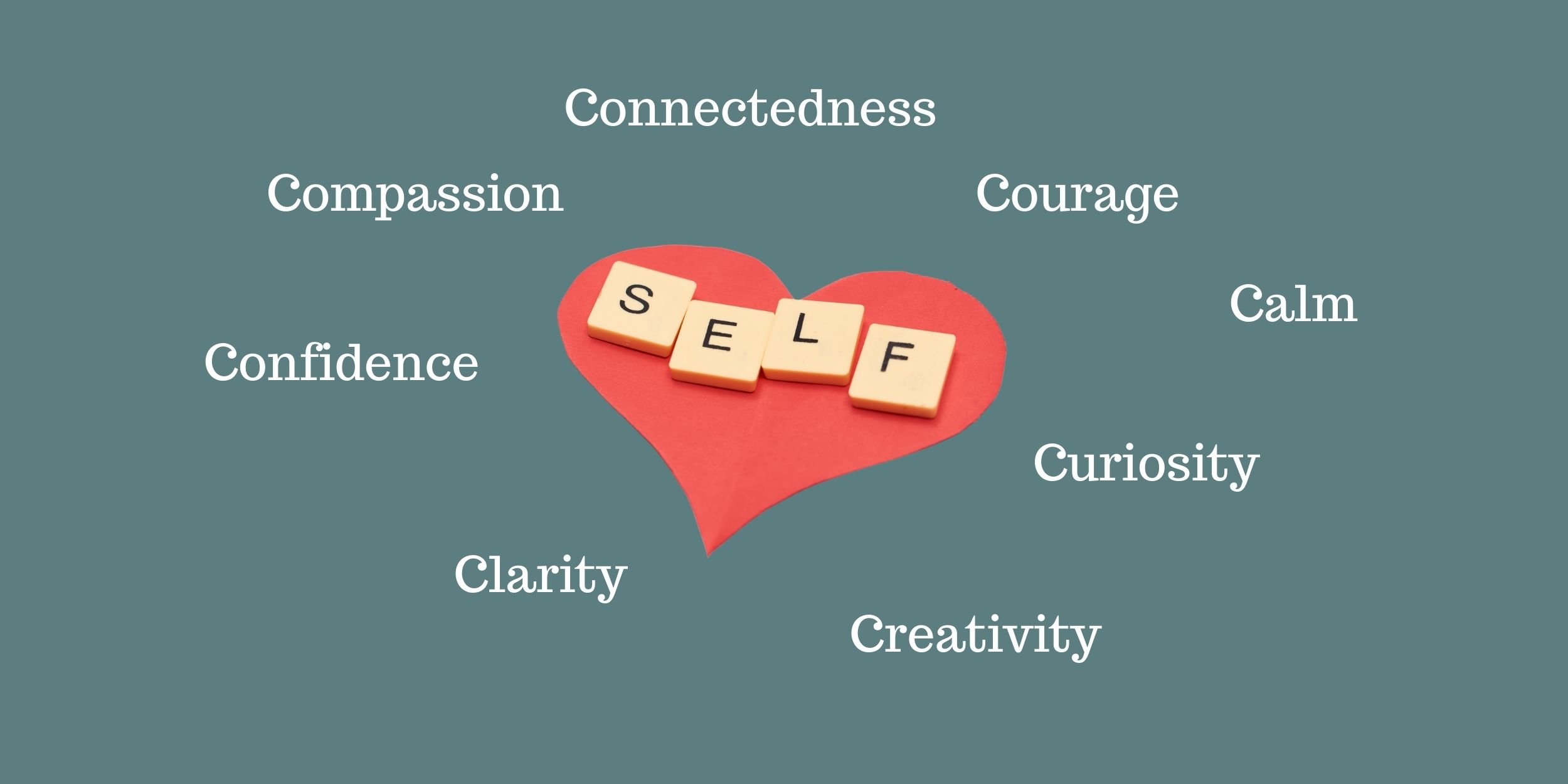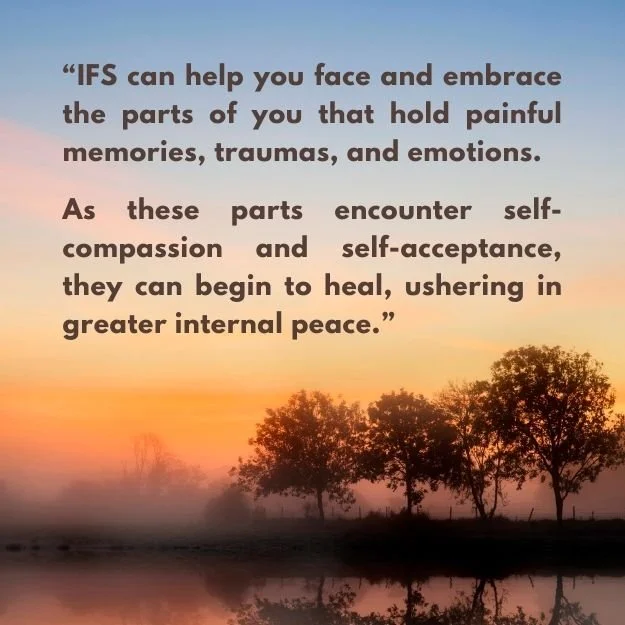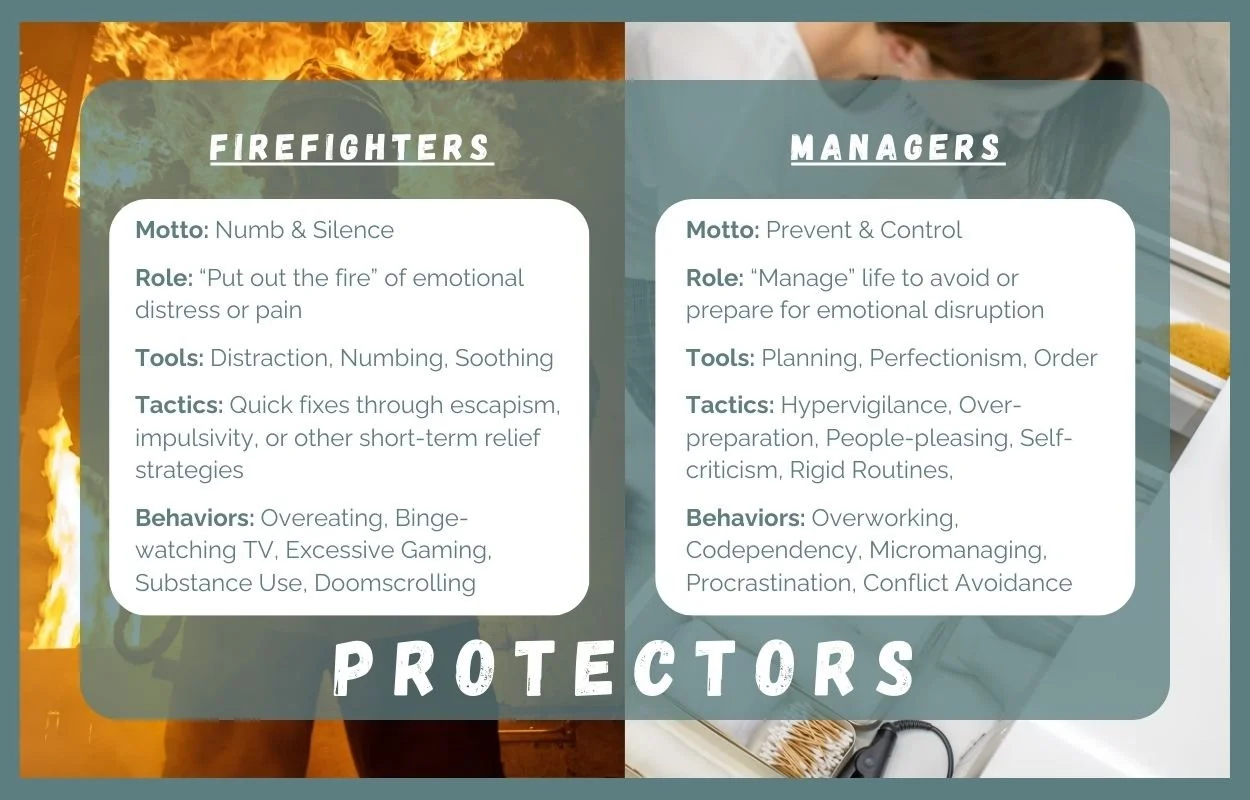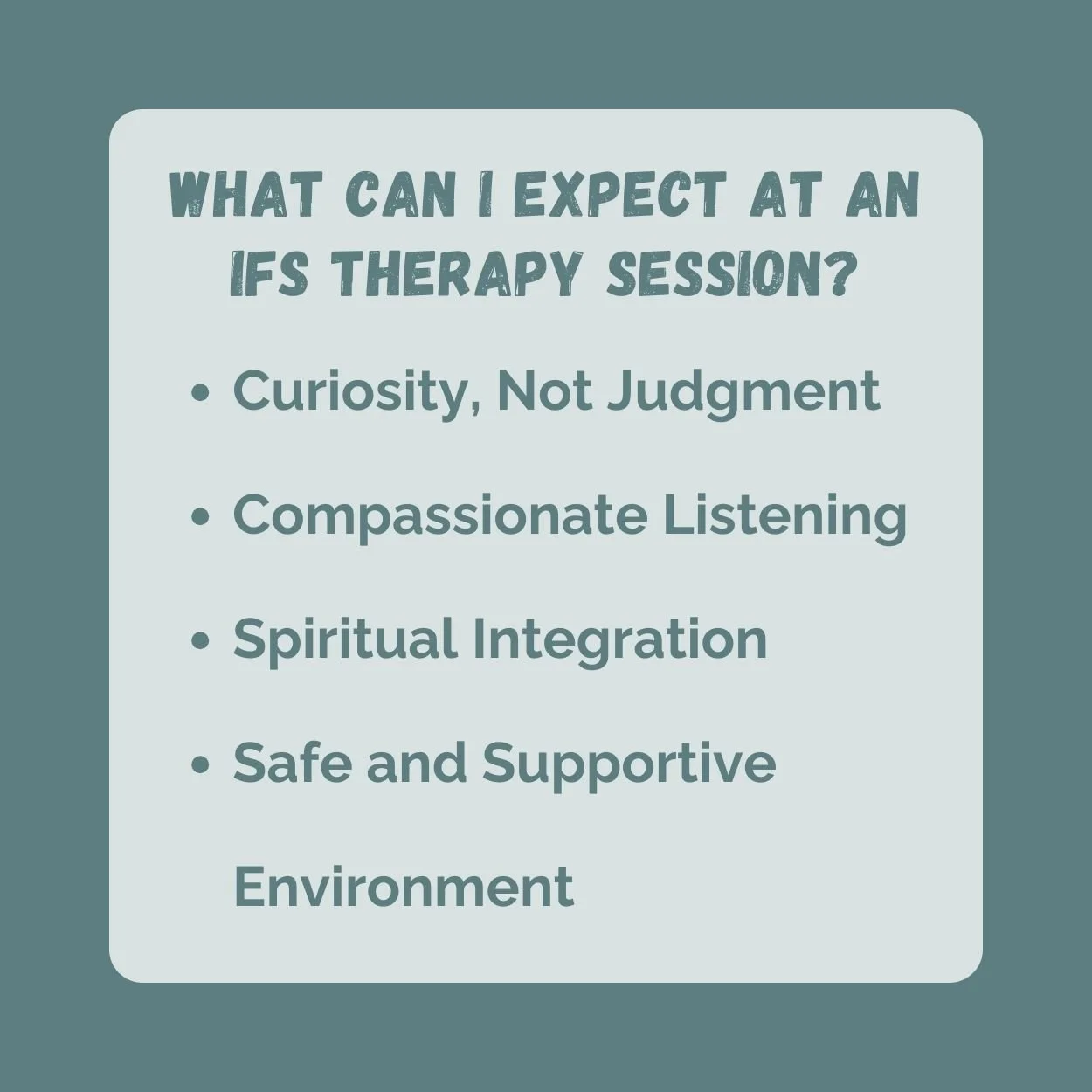Healing Through Internal Family Systems Therapy in Florida
Wesley Chapel, Tampa, Lutz, Dade City, and Nearby Areas

Do you feel like you're often battling internally with yourself? Are you torn between conflicting desires, emotions, or thoughts? Perhaps part of you longs to be selfless like Jesus, being everything for everyone, while another part feels exhausted and resentful, longing to rest and be cared for yourself.
Maybe you feel ashamed or stuck, questioning why you can’t just “get it together” or move on. Do old wounds keep resurfacing despite your best efforts to surrender, forgive, and trust the LORD for healing?
Do you wonder why, even with prayer and faith, you still struggle to “act like yourself” in certain relationships or can react in ways that seem out of character? You know that your identity is in Christ but it feels like you have a whole lot of other identities jockeying to live within you.
These inner tensions may feel like a sign of spiritual weakness, but what if they’re not? What if, instead, they are an invitation to deeper healing, restoration, and spiritual growth?
At Boundless Hope Christian Clinical Counseling, we understand the confusion and frustration of inner conflict. We also believe that God’s design for you is not flawed or broken, but intentional. Rather than dismissing or silencing your inner struggles, our approach through Internal Family Systems (IFS) therapy encourages you to see them as valuable parts of yourself, with each playing a unique role in how you think, feel, and process life.
What Is Internal Family Systems (IFS) Therapy?
IFS Therapy is grounded in an analogy; your mind is like a family with different family members taking on distinct roles to contribute to the well-being of the whole family. Some family members nurture. Some bring joy and playfulness to the family. Other family members provide and protect. This paradigm is simply a way to guide you in making sense of your internal reality.
The IFS model suggests that different “parts” of you influence your future thoughts, emotions, and behavior. Your internal consciousness is the sum of many distinct memories, experiences, beliefs, emotions, and versions of yourself at different points in your development. Some parts assume the role of protecting you, while others carry pain or vulnerability. But here's the good news: at the center of it all is your "core Self"—the God-given part of you that embodies the wisdom, peace, love, and compassion of being an image bearer.
Who Might Benefit from IFS Therapy?
Individuals with chronic self-criticism or negative internal dialogue
People struggling with unresolved trauma or intense emotional reactions
Those experiencing anxiety, depression, or low self-esteem
People feeling stuck in personal growth, decision-making, or goal-setting
Individuals with complex relationship dynamics or communication issues
Those with a history of emotional, physical, or sexual abuse
People coping with grief or loss
Individuals dealing with shame, guilt, or feelings of unworthiness
Those looking to integrate conflicting parts of themselves for a more balanced life
Internal Family System “Parts” and Their Roles
In the IFS model, there are two main categories of "parts" that operate within us:
Exiles: The Hidden, Banished, and Ignored
Exiles is a term coined to give us a way of thinking about the wounded parts of us, the internal parts with the role of safeguarding our pain, trauma, and unhealed injuries of the past. They may hold feelings of shame, sadness, or rejection. IFS can help you face and embrace these parts of you. As you learn to acknowledge and listen to them with self-compassion and self-acceptance, they can begin to heal.
Protectors: The Strong, Orderly, and Loud
Exiles are the parts of you in pain. Being in their presence, hearing their stories, and feeling what they feel is difficult. Their pain may be so great that it feels like a threat to the survival of the whole internal family system. Protectors are the other parts of us, fighting to ensure our survival. IFS categorizes two types of Protectors, Managers and Firefighters. The role of Managers is to prevent pain by hiding exiles away and Firefighters try to numb pain by silencing the exiles.
Managers: These parts act like "managers" trying to keep our lives orderly and in control. They often take on the role of perfectionists, people-pleasers, or inner critics, working to prevent the pain of our Exiles from resurfacing to the conscious mind. They may tell us to "get it together" or "do better," hoping to protect us from shame or failure.
Firefighters: When the pain of exiles threatens to become overwhelming or uncomfortable, our Firefighter parts jump in to help us escape discomfort. These parts may turn to distractions like overeating, overworking, mindless scrolling, or other numbing behaviors.
Managers and Firefighter parts are not "bad" or "sinful" in themselves; they are trying to protect and help you. But when they operate without the guidance of your "core Self," they can cause inner conflict, self-sabotage, and distress.
The Role of the Self in IFS
At the center of the IFS model is the Self—your God-given essence that reflects God’s image in you. Your Self has the capacity to be wise, calm, and compassionate, equipped to lead your inner family of parts with love and authority. We believe this Self is aligned with God's Spirit working within you. The Self allows the parts to express their concerns, release burdens, and find new roles that contribute to you overall well-being.
Rather than "fighting" against your parts by hiding or silencing them, IFS encourages you to lead them with wisdom and compassion. This doesn’t mean every part gets to make decisions, but it does mean every part is given a voice and its views are considered. For example, in a real family, a toddler isn’t equipped to drive the family car, but they can share where they would like the family to go. By listening with patience and curiosity, the head of the family can take the toddler’s desires into account and the family can have a harmonious car ride.
The 5 P’s: Cultivating a Safe Space for Internal Healing
In the IFS model, the Self plays a crucial role in creating a safe and nurturing environment for our inner parts. The 5 P’s, Playfulness, Patience, Persistence, Perspective, and Presence, serve as guiding postures to help the Self connect with and support each part of our internal system. Playfulness invites a lighthearted, curious approach, reminding us that growth doesn't have to be heavy. Patience encourages us to honor each part’s unique pace of healing. Persistence motivates us to stay engaged with even the most challenging parts, fostering trust and understanding. Perspective helps us see beyond the immediate struggle, allowing us to recognize the bigger picture of our internal world. Finally, Presence calls us to be fully engaged and grounded, bringing compassion and calm to each moment of inner connection. Together, these 5 P’s empower us to cultivate a sense of safety, self-compassion, and lasting transformation.
When you engage with your parts from a place of Self-leadership, something powerful happens:
Exiles feel safe, seen, and valued. Their burden of shame, grief, or fear is lightened.
Managers can relax. They don’t have to work so hard to control everything.
Firefighters don’t need to "rescue" you through avoidance or escape.
By accessing the Self, you can finally bring order and peace to your internal system. No part of you is ignored, exiled, or rejected.
A Christian Perspective on IFS
At Boundless Hope, we align IFS with Christian beliefs about restoration and healing. Your internal system is not something to be "fixed" but something to be understood, healed, and taught to work together. By noticing parts that are in conflict, we help you invite God's love into your inner world and empower you to experience self-compassion, clarity, and peace. Becoming a new creation in Christ doesn't mean erasing every past experience. Instead, it means integrating your past into a new whole.
Rather than suppressing parts of yourself that feel "sinful," "immature," or "unwanted," IFS invites you to show compassion toward them. Imagine Jesus welcoming sinners, not shaming them but calling them to transformation. This is how we approach each part of you. Instead of banishing Exiles, we welcome them into the light and listen to them. Instead of letting Managers run the show, we help them trust the Self and God. Instead of letting Firefighters suppress exiles, we listen for the pain they’re trying to soothe.
How IFS Therapy Can Help You
When you stop fighting yourself and start listening to yourself, profound transformation occurs. People who participate in IFS therapy often experience:
Freedom from Anxiety and Self-Criticism: By recognizing the Manager parts that drive perfectionism or anxiety, you can help them relax, leading to a calmer, more centered life.
Healing from Past Trauma: Exiles that carry trauma no longer need to be "hidden" from the conscious mind. With Self-leadership, you can face those wounds and release their hold on you.
Improved Relationships: Self-leadership enables you to respond to others with compassion and patience, even when your parts feel triggered.
Spiritual Growth: As you connect with your Self, you experience deeper clarity and connection with God, aligning your internal family with His truth and grace.
An IFS Session at Boundless Hope
During IFS therapy at Boundless Hope, your therapist will guide you in identifying and interacting with your parts. You’ll be encouraged to approach each part of yourself with curiosity instead of criticism. Sessions may include moments of reflection, mindfulness, and dialogue with your internal system. Just like Jesus listens to us in our pain, you’ll learn to listen to your parts with love and patience.
Our therapists act as a supportive presence, helping you stay connected to your core Self and grow in Self-leadership. You’ll begin to see how your inner world mirrors God’s restoration process. Finally, you can rest assured that your therapist will create an atmosphere of safety, where you can process your experiences at your own pace.
Are you ready to take the next step?
At Boundless Hope, we don’t see you as defined by brokenness; we believe you are a divine masterpiece, fearfully and wonderfully made. The Boundless Hope clinicians that provide IFS therapy are dedicated to helping you find clarity, self-compassion, and internal peace through IFS therapy. Unlike traditional therapy, which may focus on "fixing" problems, IFS helps you harmonize your parts and lead them with love.
We invite you to partner with God and our team on a journey of healing and restoration. Leanne Vaughn, Nigel Bryant, Christie Rios, Cindy Garafolo, and Jess Osborn are all eager to incorporate the IFS model into your sessions if you desire. No part of you is too "sinful" or "broken" for God’s love to transform. If you’re ready to stop battling yourself and start leading with wisdom, compassion, and faith, reach out today. Email us or call to schedule your free 15-minute phone consultation today.





